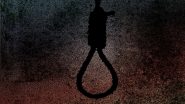Islamabad, Dec 14 (PTI) Amid the ongoing political and economic instability in Pakistan, cracks seemed to have appeared in the ruling coalition when two allied parties boycotted a Cabinet meeting over a controversial bill related to the revival of a key gold mining project in the restive Balochistan province.
The revival of the Reko Diq copper and gold mine project in Balochistan with billions of dollars at stake was cleared by the Supreme Court last week.
Also Read | G20 Presidency: India To Set Agenda Amid Global Challenges Including Russia-Ukraine War.
A Cabinet meeting presided over by Prime Minister Shehbaz Sharif to discuss the project on Tuesday was boycotted by two coalition partners — Jamiat Ulema-i-Islam (JUI-F) and Balochistan National Party-Mengal (BNP-Mengal), the Dawn newspaper reported on Wednesday.
The annoyed parties were of the opinion that the Reko Diq related bill -- the Foreign Investment (Promotion and Protection) Bill, 2022 -- passed by the Senate on Monday was against the rights of the people of Balochistan and that JUI-F and BNP-Mengal had not been taken on board during the preparation of the bill.
Also Read | India-China Faceoff in Arunachal Pradesh: US 'Closely Monitoring' LAC Situation After Tawang Clashes.
After the Cabinet meeting, both JUI-F and BNP-M held separate meetings in which they discussed the option of leaving the ruling alliance if their demands were not met, the report said.
Sensing the gravity of the situation, the prime minister formed a cabinet committee to remove the grievances of the JUI-F and the BNP-M and held out an assurance that an amendment bill would soon be tabled in Parliament after consulting the two allies.
In a post-cabinet meeting statement, Information Minister Marriyum Aurangzeb said the Cabinet has formed a committee to resolve the grievances of the annoyed parties.
“The cabinet committee will talk to leaders of the allied parties, take them into confidence and remove their reservations. An amendment bill will soon be tabled in the parliament after consultation,” she said.
Aurangzeb said the Cabinet has approved the Reko Diq project funding plan and a final deal of the project with two international firms -- Antofagasta PLC and Barrick Gold Corporation -- would be signed on Thursday.
The original agreement for the Reko Diq mining project was signed in 2006 and it set aside a share of 37.5 per cent to Canada's Barrick Gold and Chile's Antofagasta each, while the Balochistan government received a 25 per cent stake.
The two international firms were part of the consortium Tethyan Copper company and had found vast gold and copper deposits at Reko Diq. But the hugely lucrative open-pit mine project came to a standstill in 2011 after the local government refused to renew Tethyan Copper's lease, and in 2013 the Supreme Court declared it invalid.
In 2019, the World Bank's arbitration tribunal committee imposed a penalty on Pakistan for unlawful denial of mining.
In March, the federal and Balochistan governments reached an agreement with two firms — Antofagasta PLC and Barrick Gold Corporation — on a framework to reconstitute the Reko Diq project that allowed Antofagasta to make an exit.
The reconstituted project, which will excavate gold and copper reserves in Balochistan, saved Pakistan from a USD 11 billion penalty in the Reko Diq case.
Under the new agreement, Barrick decided to become a 50 per cent partner with the governments of Pakistan and Balochistan and three state-owned entities in the project, while the Chilean firm exited the contract in exchange for USD 900 million paid by Pakistani shareholders.
The Balochistan government holds a 25 per cent stake in the project under the new pact and other 25 per cent shareholding is controlled equally (8.33 per cent) by three state-owned enterprises, the Dawn report said.
The resource-rich Balochistan province, bordering Iran and Afghanistan, is home to a long-running violent insurgency. Baloch insurgent groups have previously carried out several attacks targeting the China-Pakistan Economic Corridor (CPEC) projects in the province.
(This is an unedited and auto-generated story from Syndicated News feed, LatestLY Staff may not have modified or edited the content body)













 Quickly
Quickly









 RCB
RCB







